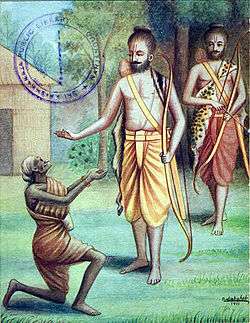Shabari


Shabari (Sanskrit: शबरी) is an elderly woman ascetic in the later versions of the Hindu epic Ramayana. She is described as an ardently devoted woman who received Rama's darshan and blessing due to her Bhakti to him.
Story
Shabari was a hunter's daughter[1] and belong to the Nishadha tribal community.[2] The night before her marriage, she saw that thousands of goats and sheep were brought by her father, which were going to be sacrificed for the marriage dinner. Moved by compassion, during the early hours of the morning, she renounced the world and ran away to meet a Master. After days of traveling, she met Sage Matanga at the foot of the Mountain Rishyamukha and accepted him as guru, serving him with devotion.[1] When her guru Matanga was about to die, Shabari— now an elderly lady— stated that after serving him throughout her life, she now sought to reach for herself the same "abode of peace" which Matanga reached.[1] Thereupon, the sage said that by the virtue of her seva (service), Lord Ram shall give her darshan and asks her to wait for his arrival. Saying thus, the sage sitting in lotus posture attains Mahasamadhi. As per her guru's words, Shabari waits for the arrival of Ram.[1]
Everyday Shabari would go out of her ashram, with the help of a walking stick and pluck berry fruits for Lord Ram. She would pluck a fruit, first taste it, and if it was sweet she would put it in her basket and discard the bitter ones. She wanted to give the good and sweet fruits to Ram.[3] The thought never came to her that she should not taste it before it was offered to a deity. Traditional writers use this narrative to indicate that in bhakti, faults are not seen by the deities. Thus collecting a few fruits, Shabari went back to the ashram and eagerly anticipated Lord Ram's arrival.[3] Shabari is commonly used as a metaphor for an endless wait for God.[4]
Arrival of Rama
According to the scriptural account, even though hundreds of other yogis were waiting to receive Rama in their ashrams, Rama went only to Shabari's ashram because of her sincere devotion. On seeing Rama, Shabari became ecstatic and said, "There were so many exalted yogis waiting for your darshan, but you came to this unworthy devotee (...) This clearly shows that you will neither see whether a devotee lives in a palace or humble hut, whether he is erudite or ignorant (...) neither see caste nor color. You will only see the true bhakti (...) I do not have anything to offer other than my heart, but here are some berry fruits. May it please you, my Lord." Saying so, Shabari offered the fruits she had meticulously collected to Rama. When Rama was tasting them, Lakshmana raised the concern that Shabari had already tasted them and were, therefore, unworthy of being eaten. To this, Rama[5] said that of the many types of food he had tasted, "nothing could equal these berry fruits, offered with such devotion. You taste them, then alone will you know. Whomsoever offers a fruit, leaf, flower or some water with love, I partake it with great joy." Lakshman did not taste the fruits. He brought them to his mouth but threw them aside considering them as impure. Pleased with Shabari's devotion, Rama blesses her with his vision. Rama notices the donas, or bowls, of handmade leaves in which she had offered the fruits and is impressed by the hard work Shabari has gone through to make them and, hence, blesses the tree so that the leaves naturally grow in the shape of a bowl. Shabari also tells Rama to take help from Sugriva and where to find him. The Ramayana says that Shabari was a very bright and knowledgeable saint.[6]
Ram's discourse
Ram delivers his discourse on nava-vidha bhakti (ninefold devotion) to Shabari,[7]
Such pure devotion is expressed in nine ways. First is satsang or association with love-intoxicated devotees and righteous people. The second is to develop a taste for hearing My nectar-like stories. The third is service to the guru (...) Fourth is to sing My kirtan (communal chorus) (...) Japa or repetition of My Holy name and chanting My bhajans are the fifth expression (...) To follow scriptural injunctions always, to practice control of the senses, nobility of character and selfless service, these are expressions of the sixth mode of bhakti. Seeing Me manifested everywhere in this world and worshipping My saints more than myself is the seventh mode of bhakti. To find no fault with anyone and to be contented with one's lot is the eighth mode of bhakti. Unreserved surrender with total faith in My strength is the ninth and highest stage. Shabari, anyone who practices one of these nine modes of My bhakti pleases Me most and reaches Me without fail. That which is most difficult for the greatest yogis was easily attained by you, Shabari, because of your sincere devotion.[7]
Shabari redirects Ram and Lakshman towards Hanuman and Sugriv.[7]
See also
Notes
- 1 2 3 4 Keshavadas 1988, p. 121
- ↑ Dodiya 2001, p. 148
- 1 2 Keshavadas 1988, p. 122
- ↑ Raj, Sundara (2007-09-28). "A novel attempt". The Hindu. Retrieved 2009-06-11.
- ↑ "Rosary of Divine Wisdom". Brig. Partap Singh Ji (Retd.). 27 August 1999.
- ↑ Keshavadas 1988, p. 123
- 1 2 3 Keshavadas 1988, p. 124
References
- Keshavadas, Sadguru Sant (1988), Ramayana at a Glance, Motilal Banarsidass Publ., p. 211, ISBN 978-81-208-0545-3
- William Buck, B. A; Van Nooten (2000), Ramayana, University of California Press, p. 432, ISBN 978-0-520-22703-3 Cite uses deprecated parameter
|coauthors=(help) - Dodiya, Jaydipsinh (2001), Critical perspectives on the Rāmāyaṇa, Sarup & Sons, p. 297, ISBN 978-81-7625-244-7
External links
- Lord Rama only thirsted for the Prema of Shabri Ji by Brig. Partap Singh Ji Jaspal (Retd.)
.jpg)
